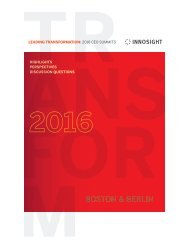TECHNOLOGY AT WORK
1Oclobi
1Oclobi
You also want an ePaper? Increase the reach of your titles
YUMPU automatically turns print PDFs into web optimized ePapers that Google loves.
February 2015<br />
Citi GPS: Global Perspectives & Solutions<br />
81<br />
The number of leisure hours in the US has<br />
increased for low-educated men but<br />
decreased for high-educated workers<br />
Other countries are seeing similar trends<br />
A World of Leisure<br />
In a 1932 essay entitled In Praise of Idleness, Bertrand Russell argued that a<br />
shorter working day would allow people to enjoy “the necessities and elementary<br />
comforts of life.” 125 How could such a life be obtained? According to John Maynard<br />
Keynes, technological progress provides the answer, potentially solving mankind’s<br />
“economic problem”, and depriving us of our traditional purpose of subsistence.<br />
Instead he predicted that we could eventually be facing the dilemma of how to use<br />
our freedom from economic cares and occupy our leisure. 126<br />
In the past, the wealthy elite have enjoyed the most leisure, while the poor needed<br />
to work relatively hard for their subsistence. According to research by Hans-Joachim<br />
Voth, average hours worked increased in Britain during the early Industrial<br />
Revolution, from 50 to 64 hours per week between 1760 and 1800. 127 At the time,<br />
Jane Austen’s novels about the wealthy elite depicted a society at leisure.<br />
Yet, over recent decades, things have been different in developed economies. Not<br />
only have average working hours declined, but the wealthy are now the ones<br />
working relatively long hours. According to a recent study, leisure in America<br />
increased by 6 to 8 hours per week for men and 4 to 8 hours for women between<br />
1965 and 2003. 128 Furthermore, research shows that low-educated men saw their<br />
leisure grow between 2003 and 2007, while highly-educated workers saw their<br />
leisure decline. More recent data from the American Time Use Survey 2013 also<br />
show that workers with at least a bachelor’s degree work on average two hours<br />
more per day than high-school graduates. 129<br />
This is not a trend that is specific to America. For the countries where data are<br />
available, the vast majority of people today work fewer hours than they did in 1990.<br />
Western Europeans, who worked more than Americans as late as 1960, now work<br />
much less suggesting that unionisation and labour market regulations are partly<br />
behind the decline in hours. 130 Leisure is seemingly also associated with<br />
productivity-increasing technological progress. Workers in Greece put in the most<br />
hours in the OECD: they work more than 40% more than Germans, for example. Yet<br />
German productivity is about 70% higher, more than making up for the difference. 131<br />
Technological change also partly explains why low-income workers enjoy more<br />
leisure. An important feature of the digital age is that it provides many things for<br />
free, giving low-income earners a more enjoyable leisure. According to a study by<br />
Daniel Kahneman, Alan B. Krueger, David Schkade, Norbert Schwarz, and Arthur A.<br />
Stone “people with greater income tend to devote relatively more of their time to<br />
work, compulsory non-work activities (such as shopping and childcare), and active<br />
leisure (such as exercise) and less of their time to passive leisure activities (such as<br />
watching TV).” As information technology makes especially passive leisure more<br />
interesting and cheaper, the demand for leisure among low-income earners is likely<br />
to increase further. Companies like Netflix and Spotify have recognised this trend,<br />
and many others are following.<br />
125 Russel (1932).<br />
126 Keynes (1930).<br />
127 Voth (2001).<br />
128 Aguiar and Hurst (2007).<br />
129 The Economist (2014).<br />
130 Alesina, Glaeser, Sacerdote (2006).<br />
131 The Economist (2014).<br />
© 2015 Citigroup










